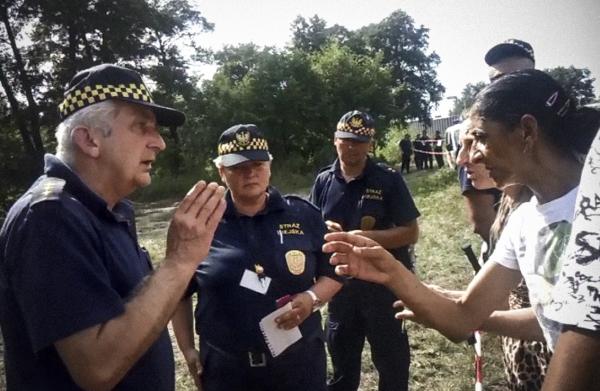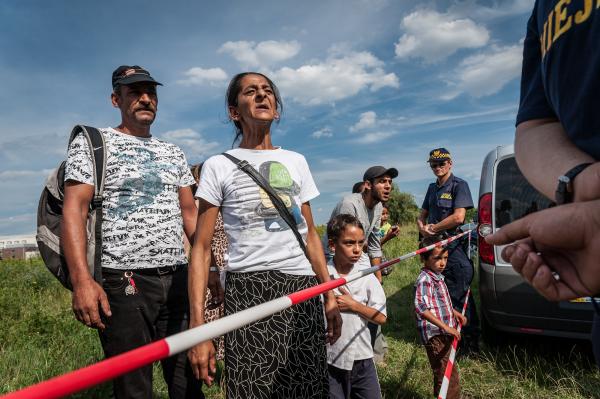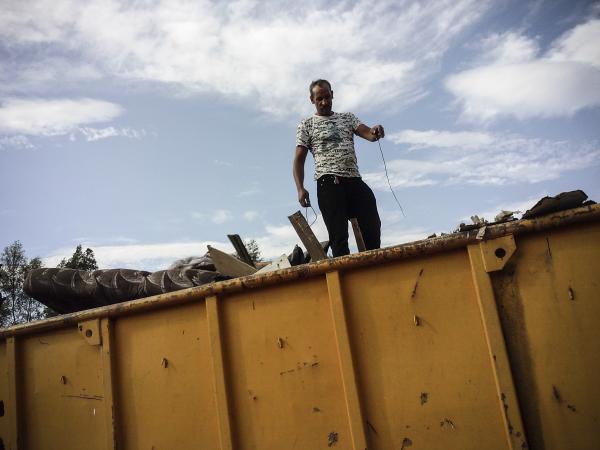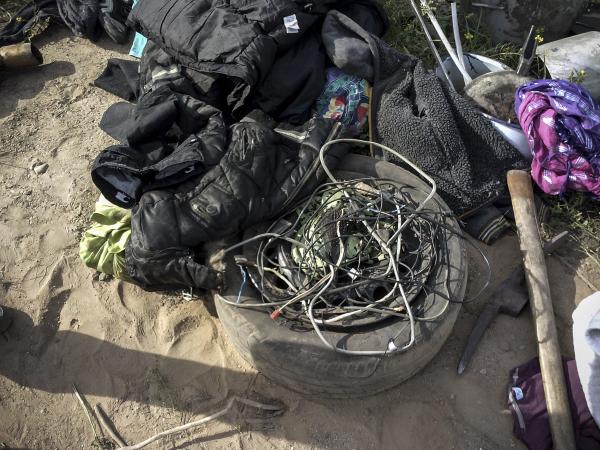Traian, Marija and their children left home on a Wednesday morning. All their clothes, medicines and documents were in the camp. As they were coming back to Paprotna Street in Wroclaw in the afternoon, it soon turned out they had nowhere to return to. The Roma camp was fenced off with a white-and-red tape saying “No Entry! Grounds Maintenance Office”. Excavators, which razed the Roma shelter to the ground, made a large family virtually homeless.
***
– We’re doing overtime already. We’ve been standing here all day,” says a municipal guard, visibly bored.
– But do you realise that people were living here?
– We have no knowledge of this. There is nobody here, after all. You can talk about this with our spokesperson.
One of the excavators which were destroying the shelters for the last few hours is now looming from behind the guard. A lorry carrying the remains of the Roma homes follows soon after. Traian and his son appears on the horizon. They can see what is happening from afar.
– You see, someone is actually living here.
***
Traian quickens his step and starts running towards the tape. The guards are coming to meet him halfway. They do not want to let him in.
– My documents! Where are my documents! I kept all my documents here! – shouts Traian, bursting with anger. –Our meds! Our clothes! Our power generator! Where did you take them?
The guards fall into silence. They are looking blankly into space, their hands behind their backs. They seem surprised even though I find it difficult to believe they didn’t realise they had been safeguarding the destruction of somebody’s home.
Roma homes look like makeshift sheds made of the bits and bobs found in a rubbish heap, but they provide clean and furnished interiors for their users. With pots and pans, beds and sometimes with a TV set powered by a petrol-fuelled generator. In the winter, their residents use a stove to cook and heat the interior. In the summer, most of the families put their stoves in front of their homes. Whoever entered Traian and Maria’s abode and made a decision to dismantle it, they must have realised they were destroying someone’s home.
Traian keeps repeating the same thing, but he becomes even more agitated. He is waving his hands in front of the guards. Marija, together with their sons Piko and Darius, follows suit. They are soon joined by Ioanna, Marija’s daughter-in-law, with her babies in her arms. The women are shocked. There is only bare ground where their homes used to stand.
– We’re left with nothing! – says Marija through the tears and falls to the ground. She snuggles up against Traian, who is still trying to make the guards tell where their belongings were taken.
Ioanna slowly recovers from the shock and asks me if I know where their clothes are. I have no idea.
– We’ve been living here for seven years. Seven years! All our belongings, where are they? Do you know where they took all our clothes? And money. I kept the money there as well. I have just bought some clothes for my children. The clothes, that’s what I want back the most.

Traian returns empty-handed. He steps away from the tape, takes his baseball cap off and starts to rub his temples. He mutters as he walks past me: “For fuck’s sake, just like at Tarnogaj.”
***
The first time I’ve heard about Tarnogaj was a few months ago when I met Traian, Marija and their family. We were standing in the courtyard of the counselling centre in Krakowska Street in Wroclaw. His parents noticed that Darius had a hearing difficulty and they went to the doctor’s.
– What kind of land is that?! Just weeds and no soil – Traian kept a slim cigarette in one hand and was waving the other over the shrubbery and the grass.
– So what about the land? You mean it’s not like in Romania? – I enquired.
– Of course not. I had land in Romania. Everything. But I had to come here. We would live here. That is, there behind the Selgros store, as you drive to Tarnogaj.
We went out of the centre and into the street. Traian tried to explain to me and show with his hands where his first camp in Wroclaw had been located. All I could understand was that it was to the south of where the store’s car park is now located.
– When was that?
– A long time ago. Ninety-four, ninety-three maybe. They took us from there. To the police and onto the plane. And back to Romania.
– You were deported?
– That’s right. Deported. The whole family. They took a military plane or something. First to the police station and then onto the plane. And they did this – at this point Traian put a cigarette into his mouth, turned his back on me and joined his wrists. This peculiar pantomime seems brutally clear: they spent their journey back to Romania handcuffed, on a military plane.
– They took us at night. To the woods.
– What woods? They let you free in the woods?
– That’s right. It was night. It was dark – Traian revealed his silver watch, which was hanging loosely from his left hand, and he pointed the hour they had arrived in Romania with his finger. His nail indicated somewhere between two and three at night. – And we were back in here in a week. We returned.
– You came back a week after deportation?
– That’s correct. Immediately. To the woods. Then across the Carpathians. We would wade through the water, through the mud, through the woods – Traian showed how the mud would reach several centimetres above his knees. – And then we took a taxi to the border, to the Czech Republic.
– That must have been expensive.
– Expensive? Hell it was. A few hundred euros, that is German marks, we would pay in marks at the time. But we had the money.
– And the land? What’s wrong with the land?
– Everything – Traian shook his head and dropped his hands, as if to show there was no point wasting his breath.
***
The Tarnogaj affair is highly unlikely to happen again these days. All the residents at the Paprotna camp are now EU citizens. Wroclaw is their new home, and no one has the right to deport them back to Romania. At least it is not as easy as twenty years ago. That being sad, no one expected that Wroclaw authorities would send excavators to the camp and have Roma homes destroyed in several hours. Without an eviction trial. Without a warning. Especially as the City Office refrained from such tactics when dealing with another Roma camp in Kamieńskiego Street.

When rumours started to fly around two years ago that Romanian immigrants would be evicted from the area, Wroclaw activists spent three days and three nights protecting the camp. Reportedly, someone saw a demolition team in the vicinity. It is still unknown whether this was just some figment of their cornered imagination or whether the Kamieńskiego camp would share the same fate as the one in Paprotna Street.
What has been revealed, however, is that several months later the police appeared in the camp serving court summonses. The Municipality of Wroclaw filed an eviction lawsuit against Roma families in Kamieńskiego. And their story hit the headlines in dailies and weeklies throughout Poland. Formally, the trial still continues, but no hearing has been held for over a year.
The camp in Kamieńskiego has the same number of residents as two years ago: around eighty people. With a contribution from the Nomada Association, some of them have successfully completed the residence registration process. Ten children from the camp received their first school certificates in June. As of September, they are going to continue their education in Year 2 at the Primary School No. 20.
On the Wednesday evening, they kept asking if the excavators would come for them as well.
***
Traian puts his cap back on and returns to the guards by the tape. “I’m going to call the police!” he says firmly.
“Agata, help us with the police,” Traian’s son asks Agata Ferenc from the Nomada Association. She has been on the ground for over an hour. She is trying to find out where all the clothes and documents were taken. With no immediate effect. Two police officers arrive after 40 minutes.
– We will report this to our officer on duty. We will find out where these things were taken. Nobody has thrown them away, they were probably seized as evidence. But if you’re unable to find them, you can report a burglary. You can come tomorrow to testify with a community interpreter. Take it easy – the police officer is clumsily trying to calm the situation while covering a camera lens.
– But that’s all I’ve got! – Traian clutches at his trousers and shirt. He is trying to explain to the police that he cannot wait by tomorrow as his medicines were also in the camp.
– I’m calling my officer on duty. We will soon find your belongings. Take it easy – says the police officer.
Ioanna, at her wits’ ends, is pacing with her child along the tape. She starts to shout at the guards and two social workers standing in the area behind the fence. She finally gets tired and sits by a municipal guards car.
– I don’t know. I don’t know where we are going to sleep. Where we are going to go. To the centre. To the market square maybe – Ioanna covers her face with her hands.
The two social workers come close to the tape.
– How could you do this! Is this dialogue? Is this what mediation looks like?” Agata, visibly edgy, tries to get a grasp of the situation and is literally flooding the two women with questions.
– I’m here to find you a new home,” says social worker Iwona Tworek.
Traian grabs his head. – But you’ve demolished our camp! Where is my power generator! Where are my clothes?! Where are our things?!
– I’m here to find you a new home – repeats Iwona Tworek, oblivious to Traian’s words, as it were. She continues this impossible dialogue, still standing behind the tape in the company of the guards. Eventually, she takes out a piece of paper and writes down the name of a centre which the Paprotna residents can move into. She gives it to Marija. She explains that they will be provided with food and accommodation.
However, the Roma family decides to stay for the night at their friends’ place in Kamieńskiego They apparently find it difficult to trust someone who stands on the same side as the people who have just demolished their home. – The officer on duty has just called back. Today’s demolition of illegal buildings was carried out pursuant to the decision of the District Building Control Inspector. Your belongings were taken by a company called Trans-formers. You need to call the Grounds Maintenance Office to find out where they are – announces the police officer. – Does anyone need medical assistance? No one? So that would be all.
– But this is an illegal eviction – says Agata. – Are you going to do anything about this?
– We are dealing with crime and offences. You need to come to the police station and report a crime.
***
Maciej Mandelt from the Nomada Association approaches an information desk at the Wrocław Psie-Pole Police Station.
– Wait a moment – says the officer on duty. – Do you have an appointment?
– We would like to report a crime. These people are victims of yesterday’s eviction in Paprotna Street. They said they would come.
– OK. Now wait.
A local TV reporter tells me that it may be difficult to find Traian and Maria’s belongings. The City Office said the home was empty.
We are still waiting for a police officer to come downstairs and deal with our case. An elderly lady from a poster attached to the information board gives a warning against fraudulent “grandsons”. Several items of information for those who lost their ID can be found below. Sadly, there is no information for those who were deprived of their documents by municipal guards or social workers.
My phone starts vibrating in my pocket. Agnieszka Szczepaniak from the Noomada Association calling: “Listen, I’ve called this Trans-formers company. They refused to speak to me. They told me I should call the City Office Press Department instead. That’s beyond me. The spokesperson will tell you where to find these things. Is this their job at all? I’ll call you back in fifteen minutes.”
The police officer comes and asks Marija, Traian and Maciek upstairs. They return after forty minutes.
– They made a list of our belongings. A power generator. A TV set. Clothes. Money. One by one – Traian reports the procedure.
– Traian puts out his wallet. He shows how much money he’s got, and explains this is all they have. And the clothes he’s wearing – adds Maciek. – Now Ioanna has to come and testify as well. We have to wait and see what the police is going to do about this…
A phone call from Agnieszka stops our conversation. “Listen, this is just mind-boggling. It turns out that the city has burgled the Gypsies”.
I can hear how her voice reverberates with anger and a sense of absurdity. – I called Anna Bytońska from the City Office Press Department. She told me there were no valuables in the camp. That’s just beyond me. She only said something about the power generator, that it was taken because it posed a threat to the environment – she said.
Traian is speaking to someone on the phone. He is waving his hands nervously. He ends the conversation and says he may know where their things are.
***
– Where? – I ask.
– In a rubbish dump – he answers, all the more annoyed as he fumbles for his favourite Winston Slims. He eventually finds half a cigarette, lights it and gradually explains everything. He asked one of his friends to follow the lorry with their belongings. Princ got into his car and followed two Trans-formers lorries. They parted their ways as they entered the road to Oleśnica. One of them turned into Parkowa Street in Długołęka, and drove to a rubbish dump behind Szczodre. The other drove to Oleśnica. Princ followed the former. He has just called and told everything.
In just twenty minutes, Traian is able to arrange a car with three Kamieńskiego camp residents. We are heading to the location Princ has indicated. The driver is speeding so much that I begin to have doubts if all these sacred images inside would really come to rescue if we had any head-on collision on the bend.
As we reach our destination, Traian jumps of the car and immediately recognises his belongings. They can hardly go unnoticed: a large yellow Trans-formers container with a number five in black is standing desolate in the middle of a dumping ground. The container is filled with what used to be Traian, Marija and Ioanna’s home back on the Wednesday morning.

A quick conversation with an excavator operator and a ground manager soon follows: “Of course, if this is the case, they can go through the container. That’s obvious. We have just found a death certificate in the rubbish, we’ve put it aside,” says the man who looks like the ground manager. He turns out to be extremely friendly, especially to a group of Gypsies who have just raised clouds of dust as they entered his area.
Traian is even able to persuade the excavator operator to dig in the mounds where some of the things from the container were thrown. But he loses his patience in a moment. He grabs a pickaxe on the ground and starts to dig in the mounds composed of wood, beds, rubble and electronic appliances. As he is searching for his belongings, he also grabs a chance to vent his anger, the latter rising up in him for the last two days.
– So there was nothing in the camp, was it? And what about this? A TV set is nothing? For fuck’s sake! – Traian shows me the remains of what used to be his TV set. – These are Pik’s shoes. Just look! Take a photo! Take a photo! We’ll give them to the police! Bastards!
While I am taking photos, Traian manages to find some of the clothes. The TV set, a decoder and children’s bikes are completely destroyed. He spends another half an hour with his son and friends from Kamieńskiego in the container. They pull out a duvet, which is pretty clean.
– Here it is! And a bag with my meds! The most important! – he manages to find the medicines which he was telling me about. He has hypertension and he was constantly afraid his heart would conk out if he missed just one pill. – The pink ones. These are my heart pills – he shows them to me, visibly happy.

We are spending one more hour at the ground. Eventually, we leave the area with a boot full of clothes and a heavy muffler Traian was planning to install in his car. The muffler is heavily dented in a few places, but Traian’s son keeps convincing me that it is still worth quite a lot at a scrap heap. We are also carrying two car wheels and an eiderdown. And the meds.
However, everyone lost hope they would be able to find children’s birth certificates and the money.
“The certificates. I wish I had found them. And the power generator. They are lying, these fuckers. It was in complete order. It was new and working, I have bought it lately. It was my generator,” says Traian in the car. He changes his T-shirt. He takes off a T-shirt with black prints on it (New Hardcore Rebel is everything I can decipher) and puts a white-and-navy-blue polo shirt instead.
Translated by Bartosz Sowiński.
![Political Critique [DISCONTINUED]](http://politicalcritique.org/wp-content/uploads/2015/09/Political-Critique-LOGO.png)
![Political Critique [DISCONTINUED]](http://politicalcritique.org/wp-content/uploads/2015/09/Political-Critique-LOGO-2.png)
1 Comment